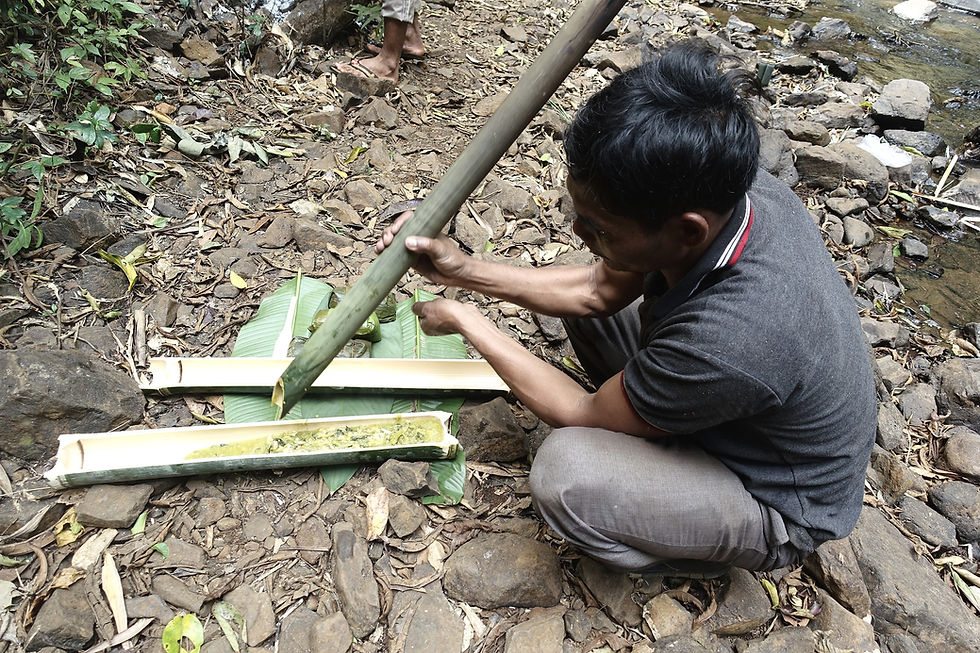Ever wondered what snake tastes like? Eating ants in the jungle, swimming with an elephant or sharing a banquet with tribes people? Welcome to Mondulkiri, an untouched utopia with a deep history.

Mondulkiri is one of the only regions left in the world that is still very much untouched. Rich in wildlife, jungle and the animist culture of the Pnong tribes people, life here is still pretty rural, however, this is changing with urbanisation and the development of roads and electricity. Located in the east of Cambodia bordering Vietnam, it is surrounded by dense jungle, rivers, and villages with landscapes more beautiful than a Monet painting. I decided to visit here to experience the indigenous way of life by spending time with the extraordinary tribal communities of the Pnong people and what I was about to discover was so much more than I ever could have imagined.
Through the Elephant Community Project I was able to eat, cook, stay and trek with the indigenous Pnong People of the Patang and Pou Lung villages. The project is a locally run initiative to preserve native wildlife and empower the Pnong communities who have inhabited the lands for over 2000 years. Their way of life is unique through a caring and respecting nature which is greatly shaped by their animist religion, believing that everything has a spirit, and they sustainably live off the land mostly in harmony with each other and nature. This ability has powered their survival over the years.
Making the best out of what they sow, grow and forage, albeit simple dishes were prepared with such love and care. This was evident during my stay with an elderly indigenous couple who spent all day meticulously preparing dishes so they could not only share food from their garden but also share tales and stories that eating together brings.
I received plenty of home cooking during my time in the highlands and as challenging as cooking in the jungle may sound, I encountered this numerous times. Typically most dishes consist of vegetables, meat (normally pork or chicken) and rice. For example, a tribes woman prepared a banquet beside a creek (think fire and hammocks), dishes were jungle-rustic including braised whole bamboo with chilli sauce, chicken and pumpkin stir fry, steamed rice and chilli salted pineapples. Similar to Italian dishes there were few ingredients used and so really highlighting key ingredient flavours. For example the pumpkin dish had a natural sweetness which would be overshadowed if the dish contained other components.
Additionally, I got the chance to learn about the jungle and its ingredients with an exceptional guide and tribeswoman. She knew everything and anything about the jungle, every plant and insect had a purpose in their way of life be it smoking leaves, boiling lizard eggs, making kindle or eating citrus ants. I partook in the eating of live red ants, which were surprisingly delicious, with a citrus ginger flavour and a crunchy texture that pops. These are typically used in teas, stir fries and as snacks.
My guide was knowledgeable, positive and full of life yet I could tell from her character that she was deeply haunted by the past. Blind in one eye with many scars it was obvious that something had happened and happened it had. Her knowledge was born out of sorrow, as a child her mother and siblings were tied to a post and burned alive due to being accused of witchcraft. Unfortunately, witchcraft accusations are common within a culture that even to this day can result in murder. With no parents her only option was to live alone in the jungle from the age of six until she was found much later on and placed into an orphanage. During this time she survived in the jungle using the skills she had learned from her people, the same people that she would later forgive and return to live with in Mondulkiri. By this time the Khmer Rouge, the brutal leading regime, had laid roots in the highlands which exploited the people, decimated the population and left their culture in tatters, reportedly continuing until the late 1990's.
During my home stay in the hilly lands I was introduced to my guide Wyn. An ex-poacher turned guide that could give Bear Grylls a run for his money, at the young age of five he was given a gun and forced into the Khmer Rouge. His skills were unbelievable, he could navigate the jungle for hours without a map, use the natural materials of the jungle to make trinkets and tools, and pick fruits and flowers fresh from the tree for me to try including the obscure looking cashew fruit. What was most astonishing was his fearless ingenuity to catch, prepare, and cook a set of meals in the deepest areas of the jungle with nothing but a knife and fire. He made an entire kitchen out of bamboo; cups, spoons and even a bamboo cooker.
When a common poisonous snake was spotted on a tree branch just above our heads he captured it with his bare hands and in true survivalist style cooked it and served it for us. Now, I've never eaten snake before, but I couldn't refuse. It is not endangered and he had put himself in harms way to get it to the table. I was pleasantly surprised, with a bony structure the meat was white and tasted similar to chicken. But the kitchen didn't stop there, a bamboo tube was served with "jungle soup" made by preparing vegetables, water and mushrooms reduced over fire in a bamboo trunk. The soup tasted savoury with charred back notes and was served with banana leaf wrapped rice, vegetables and meats. When I asked where Wyn learned his skills his reply was his father, knowledge that had been passed down through generations.
Elephants form a huge part of the tibal way of life and as such I was acquainted with a 53 year old retired elephant called Mukoon. Owned by the villagers, I was able to share breakfast, play and swim with her in a local creek. Elephants hold a large significance in the culture because they are revered animals within animism being held in the same respect as humans. These animals cannot be hunted, mistreated or eaten and doing so is believed to bring misfortune and illness to the community. Unfortunately, under the Khmer Rouge regime, animals were stripped from their owners and either eaten or worked to death so in response the locals would often flee to the jungle with their elephant for survival.
Elephants were first domesticated and put to work by the tribes people for agriculture yet with changing laws, and the development of modern machinery, they have now become largely redundant. Still remaining within communities as pets, tourism now plays a large part in keeping these animals in the local society because without it these majestic beasts would starve due to the little riches these humble people have to keep them fed.
From meeting the different tribes people I started to understand their culture and it dawned on me they rely on the land to live and through all of these hardships has come a deep knowledge and understanding of food, medicine and the environment. In history these were already resourceful people, respecting nature, taking what they needed and leaving what they didn't, having very little impact on their surroundings. Yet with an evolving society over the years they have been drafted into battles which were not theirs to fight, be it the French colonisation or the Khmer Rouge. This impacted their culture dramatically leading to many deaths, degradation of tradition and redundancy of their domesticated elephants. Yet through their fundamental understanding of biodiversity they were able to survive and now more than ever these people are facing a very different type of battle, they are losing the very land they need to live with very little support to prevent it. With so much unknown about this unique culture combined with the extreme loss of lands and ecosystem there is a very real risk we will lose this culture and the unique dishes and ingredients which attribute to their very being before it's even been fully discovered. So visit while you can for a truly inspiring and enlightening experience.
Video of Indigenous Mondulkiri Province
If you liked this article please give it a share or us a follow.
#recipeswithoutborders #travel #mondulkiri #elephants #tribes #bunong #pnong #cambodia #food #foodandtravel #culture #jungle #junglekitchen


















































Comments